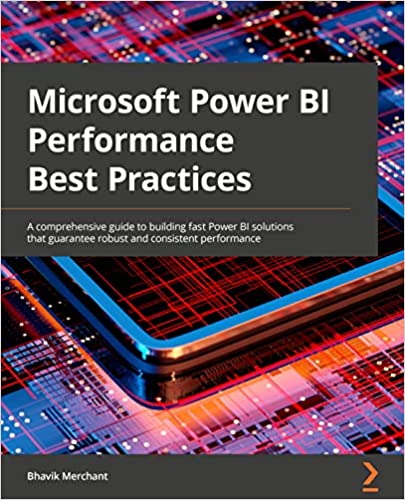Bhavik is the author of Microsoft Power BI Performance Best Practices, we got the chance to sit down with him and find out more about his experience of writing with Packt.
Q: What are your specialty areas?
Bhavik: Deep experience in analytics theory and practice especially on Microsoft Azure and Power BI
Q: How did you become an author for Packt? Tell us about your journey. What was your motivation for writing this book?
Bhavik: While working at Microsoft I was involved in performance measurement and optimization work internally and for large customers. It became apparent that there was no single place to find this knowledge as it covered so many areas of the product and covered different personas and skillsets. I was asked to prepare advanced training for top Microsoft partners globally and this course was very well received. So, when thinking about a topic I figured I could flesh out all the topics I covered and present them in a book.
Q: What kind of research did you do, and how long did you spend researching before beginning the book?
B: I probably spent about 2 days performing research and planning before the book. However, some chapters did need additional research and development which I did before and during the writing.
Q: Did you face any challenges during the writing process? How did you overcome them?
B: I had some very busy periods at work and had some family related challenges too. This made it hard to keep up with the schedule at times, and this did delay the book a few months. Also, a major part of the product changed significantly during the writing process which completely changed the plan for the last chapters. Luckily due to the initial delay, this new version was released before I reached those chapters, so i was able to include the latest material and adjust the chapter layout without any issues.
Q. What’s your take on the technologies discussed in the book? Where do you see these technologies heading in the future?
B: I’m really excited to see how the Azure technologies get more strongly integrated into Power BI in the future.
Q. Why should readers choose this book over others already on the market? How would you differentiate your book from its competition?
B: There aren’t any books that I am aware of that focus purely on performance. There are certainly other good books out there that touch on aspects that I talk about, but they are not a comprehensive performance guide. A reader who is struggling with the speed of their solutions should be able to pick up this book and get a lot of ideas and a structured process to improve performance.
Q. What are the key takeaways you want readers to come away with from the book?
B: – You should consider every area of Power BI for performance management, not just report design. The data model and DAX often have the largest impact on performance.
– Set realistic targets and be open to having different targets for different levels of complexity
– Performance related work should be done at every stage of your BI lifecycle. It is too late to tackle it before deploying to production.
– Governing performance successfully requires teamwork and collaboration between different roles
Q. What advice would you give to readers learning tech? Do you have any top tips?
B: Try to get some hands-on practice with any new tech you are grasping, it really helps to re-enforce knowledge.
Q. How would you describe your author journey with Packt? Would you recommend Packt to aspiring authors?
B: The journey was positive for me. I had a lot of guidance and support, and the communications and expectations were clear.
Q. Can you share any blogs, websites and forums to help readers gain a holistic view of the tech they are learning?
B: https://docs.microsoft.com/en-us/learn/powerplatform/power-bi
https://www.youtube.com/channel/UCFp1vaKzpfvoGai0vE5VJ0w
https://blog.crossjoin.co.uk/
https://exceleratorbi.com.au/blog/
https://www.fourmoo.com/blog/
https://dataveld.com/
https://powerbi.tips/
https://prathy.com/
https://www.kasperonbi.com/
Q. What are your favorite tech journals? How do you keep yourself up to date on tech?
B: I use a news reader to curate general topics around analytics for me, and I also follow product blogs to see the latest announcements. The list of resource I provided earlier are also a source of learning.
Q. How did you organize, plan, and prioritize your work and write the book?
B: Since I had already developed a Power BI performance training course, I was able to take the structure and re-organize it a little to work better for a book. I did a lot of the writing on evenings and weekends, though the latter was sometimes difficult due to much needed family time. Most of the work was done in the late hours of the night stretching into early morning, which is something I am able to when needed.
Q. What is that one writing tip that you found most crucial and would like to share with aspiring authors?
B: Believe in yourself and just give it a try. It is not as hard as you might think. My rule of thumb is to allocate at least 2 hours per page, but this doesn’t include any preparation time for hands-on materials.
You can find Bhavik’s book on Amazon by following this link.









